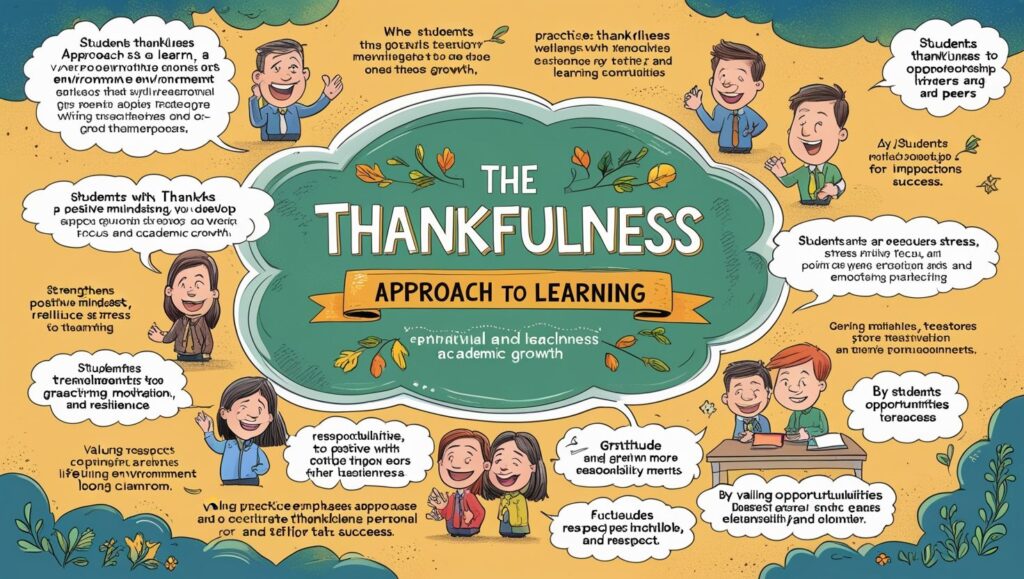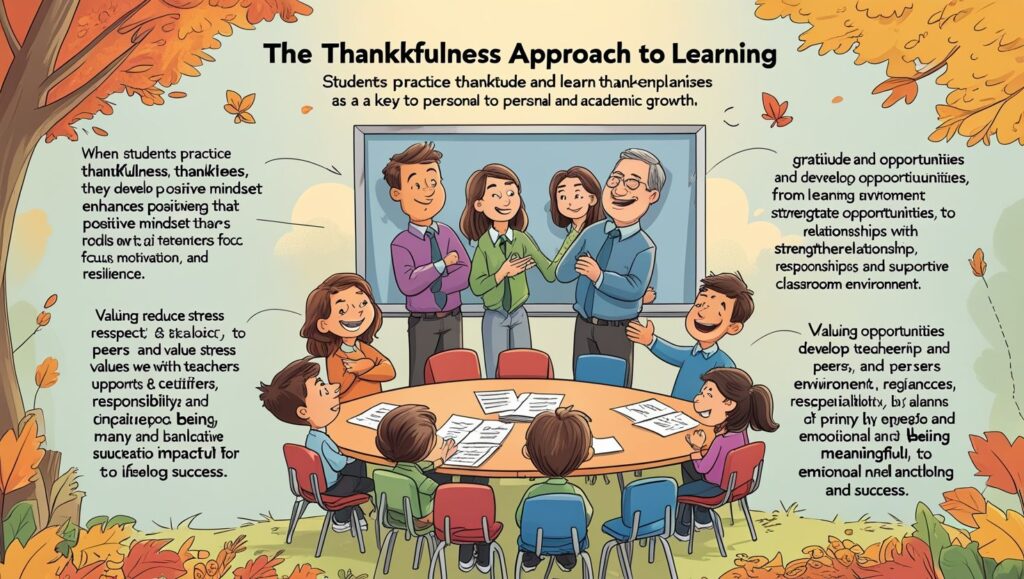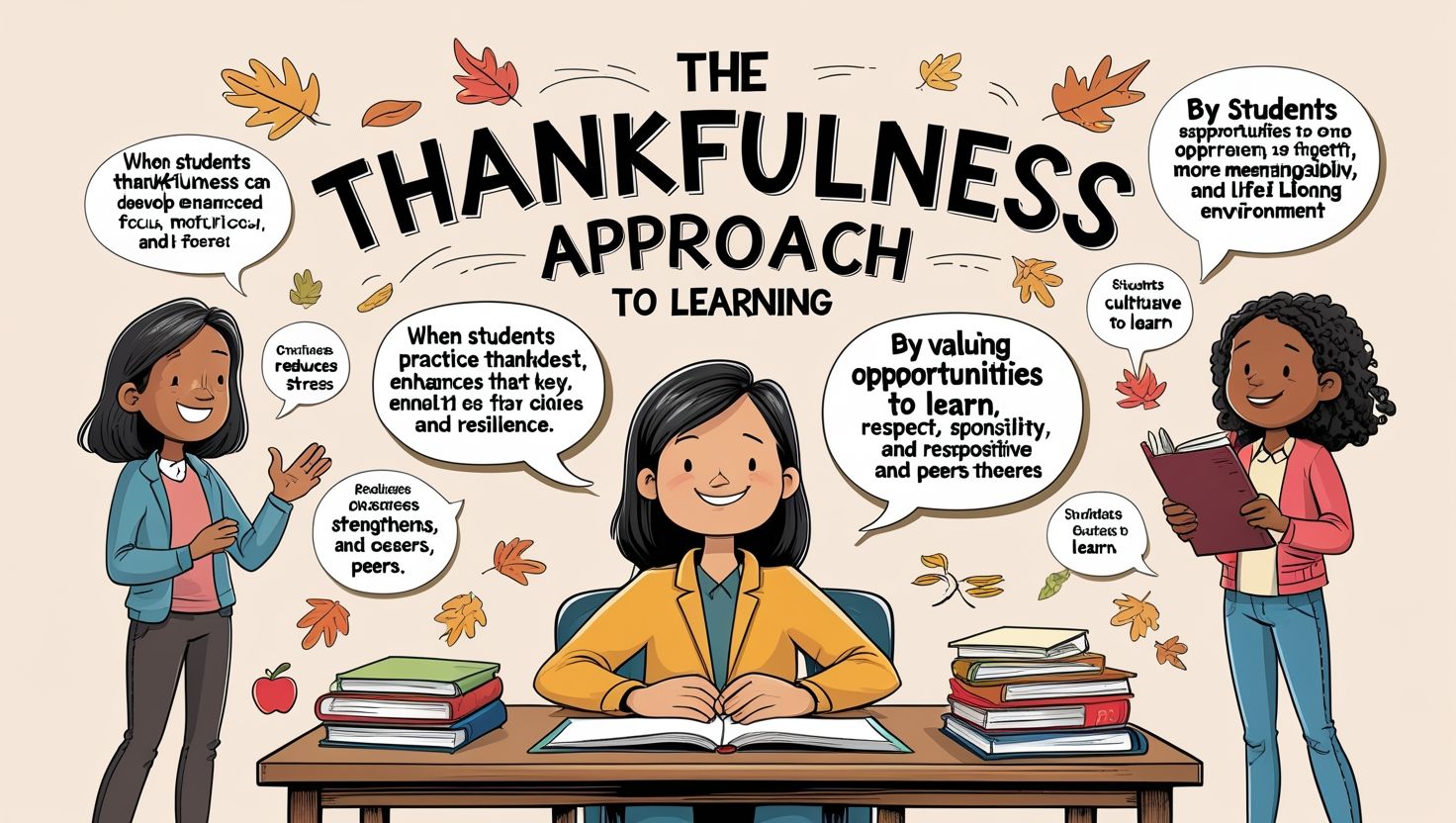Introduction
In the journey of education, the methods we choose to learn are as varied as the subjects themselves. Among these diverse strategies, one often overlooked yet deeply powerful method stands out—the Thankfulness Approach to Learning. Built upon the practice of gratitude, this approach reshapes the very foundation of education. It fosters a mindset that not only strengthens motivation and retention but also enhances emotional well-being. By integrating gratitude into learning, students and educators alike experience deeper engagement and a more fulfilling educational journey. In this discussion, we explore the guiding principles of the Thankfulness Approach, its many benefits, and its practical applications, highlighting how it can truly transform the way we learn and teach.
Principles of the Thankfulness Approach
Gratitude as a Catalyst
At the heart of this approach lies gratitude, acting as a powerful force in the learning process. When learners develop appreciation for resources, opportunities, and the support systems around them, they engage with education in a more meaningful way. Gratitude shifts focus away from scarcity and directs it toward abundance, enabling learners to view challenges as possibilities. This shift not only strengthens engagement but also makes students more open and receptive to new knowledge.
Mindful Reflection
Equally important is the role of mindful reflection. Learners are encouraged to pause during their journey, recognizing the progress made, the lessons learned, and the obstacles overcome. By engaging in reflective practice, students gain clarity and build resilience. These moments of gratitude-filled reflection transform learning into a thoughtful process rather than a rushed task. They help learners adapt, stay motivated, and develop a deeper sense of purpose in their educational efforts.

Celebrating Progress
Another core principle is the celebration of milestones. In this approach, no achievement is too small to recognize. Whether mastering a new idea, completing a complex task, or simply committing to consistent effort, every step is appreciated. Celebrating progress reinforces positive behaviors and boosts confidence. It encourages learners to value persistence and dedication, ensuring they remain motivated throughout their academic journey.
Cultivating Empathy
Gratitude also extends beyond individual success. Learners are encouraged to recognize and appreciate the contributions of others—teachers, peers, and communities that make education possible. This practice nurtures empathy, humility, and respect. By acknowledging the interconnected nature of learning, students gain a richer, more collaborative educational experience. Empathy not only enriches relationships but also deepens the sense of belonging within the learning environment.
Benefits of the Thankfulness Approach
Enhanced Motivation
One of the most immediate benefits of gratitude in education is a boost in motivation. Rather than relying only on grades or external rewards, students develop intrinsic motivation. They begin to value learning itself, appreciating the privilege of education and the opportunities it brings. This internal drive makes them more committed, passionate, and resilient in pursuing knowledge.
Improved Retention
Gratitude also strengthens retention and recall. When learners approach new information with appreciation, their brains form deeper connections, allowing knowledge to stick more effectively. Gratitude reduces stress, clears distractions, and fosters focus, which improves cognitive performance. As a result, students not only understand material better but also remember it longer, making the learning process more lasting and impactful.

Resilience in Adversity
Learning is not without its challenges. The Thankfulness Approach equips students with resilience to face setbacks. By acknowledging small wins even in difficult times, learners build confidence and persistence. Gratitude allows them to reframe challenges as growth opportunities rather than failures. This shift in mindset ensures that obstacles strengthen rather than discourage their learning journey.
Cultivation of Well-being
Finally, gratitude significantly contributes to overall well-being. Research consistently shows that grateful individuals experience greater positivity, emotional balance, and satisfaction. In an educational context, this translates into improved focus, reduced anxiety, and a healthier attitude toward challenges. By prioritizing gratitude, students not only excel academically but also enjoy personal growth, happiness, and a more balanced outlook on life.
Application of the Thankfulness Approach
Incorporating Gratitude Practices
Teachers can make gratitude an active part of learning through simple, practical steps. Activities such as keeping gratitude journals, writing thank-you notes, or reflecting on achievements help students internalize appreciation. Group discussions or classroom rituals that highlight gratitude can create a supportive and uplifting environment. By embedding these practices into the curriculum, educators cultivate a culture of thankfulness that extends beyond the classroom.
Modeling Gratitude
Educators also play a vital role by modeling gratitude themselves. When teachers openly express appreciation for students’ efforts, acknowledge their colleagues’ support, or celebrate the joy of teaching, they inspire students to adopt similar attitudes. Such authentic demonstrations of gratitude build trust, respect, and positivity in the classroom. This environment not only motivates learners but also nurtures a shared sense of purpose and collaboration.
Conclusion
The Thankfulness Approach to Learning offers more than just a method of acquiring knowledge—it provides a transformative mindset. By integrating gratitude into education, learners experience greater motivation, stronger retention, resilience in the face of challenges, and improved emotional well-being. Its principles—reflection, celebration, empathy, and appreciation—enrich both the individual and collective learning experience. When educators incorporate gratitude practices and serve as role models, classrooms become vibrant communities where knowledge is valued, growth is celebrated, and joy is shared. Ultimately, the Thankfulness Approach reminds us that learning is not only about reaching academic goals but also about appreciating the journey itself. With gratitude as a foundation, education becomes a path to both knowledge and fulfillment.

Thanx for the effort, keep up the good work Great work, I am going to start a small Blog Engine course work using your site I hope you enjoy blogging with the popular BlogEngine.net.Thethoughts you express are really awesome. Hope you will right some more posts.
I like this weblog its a master peace ! Glad I detected this on google .
rhuumh
re98yo
nk6zhl
Your place is valueble for me. Thanks!…
orpgzt
Make mornings more adorable with this Hello Kitty alarm clock CD player. Ideal for kids and collectors alike, this charming CD clock radio includes all the basics: AM/FM radio, programmable CD playback, and reliable alarm settings. Wake up to your favorite CD or a cheerful radio station with built-in stereo sound. A large digital display and simple controls make it easy to use, even for younger users. Combining cuteness with functionality, it’s a top pick among themed alarm clocks with CD players that bring fun and joy to your space.
Very good site you have here but I was curious if you knew of any forums that cover the same topics talked about here? I’d really love to be a part of group where I can get feedback from other experienced individuals that share the same interest. If you have any recommendations, please let me know. Bless you!
Thanks for another fantastic post. The place else may just anyone get that kind of info in such a perfect approach of writing? I have a presentation next week, and I’m at the look for such info.
Woah! I’m really enjoying the template/theme of this blog. It’s simple, yet effective. A lot of times it’s very hard to get that “perfect balance” between usability and appearance. I must say that you’ve done a awesome job with this. Additionally, the blog loads very quick for me on Opera. Exceptional Blog!
There is noticeably a bundle to know about this. I assume you made certain nice points in features also.
Thank you for the auspicious writeup. It in fact was a amusement account it. Look advanced to far added agreeable from you! However, how could we communicate?
Hiya, I’m really glad I’ve found this info. Today bloggers publish just about gossips and internet and this is really frustrating. A good site with interesting content, this is what I need. Thanks for keeping this website, I’ll be visiting it. Do you do newsletters? Can’t find it.
I haven’t checked in here for a while because I thought it was getting boring, but the last few posts are great quality so I guess I’ll add you back to my everyday bloglist. You deserve it my friend 🙂
Sarıyer su kaçak tespiti Teknoloji, kaçak tespitini her geçen gün daha etkili hale getiriyor. https://followgrown.com/read-blog/21993
Turkish coffee tasting I loved the storytelling aspect of the tour. https://bannockburnadvisory.com/?p=4577
Blue Mosque tour Our guide answered all our questions patiently. https://jvvisual.com.br/?p=4792
Thanks for every one of your work on this site. Betty really likes working on investigations and it’s really simple to grasp why. Most people notice all relating to the compelling tactic you provide efficient tactics on this web site and therefore invigorate participation from people on this concern then our own simple princess is really being taught a whole lot. Take pleasure in the remaining portion of the year. You’re the one performing a brilliant job.
Howdy are using WordPress for your blog platform? I’m new to the blog world but I’m trying to get started and set up my own. Do you require any html coding expertise to make your own blog? Any help would be greatly appreciated!
F*ckin’ tremendous things here. I am very satisfied to peer your article. Thanks so much and i am looking ahead to touch you. Will you kindly drop me a e-mail?
Applreciating the time and effort you put into our site and in depth information you present.
It’s nice to come across a blog every once in a
while that isn’t the same unwanted rehashed information.Fantastic
read! I’ve bookmarked your site and I’m adding your RSS feeds to my Google account. https://fortune-glassi.Mystrikingly.com/
Nice read, I just passed this onto a colleague who was doing a little research on that. And he actually bought me lunch because I found it for him smile Thus let me rephrase that: Thanks for lunch! “We know what happens to people who stay in the middle of the road. They get run over.” by Ambrose Gwinett Bierce.
The next time I read a blog, I hope that it doesnt disappoint me as much as this one. I mean, I know it was my choice to read, but I actually thought youd have something interesting to say. All I hear is a bunch of whining about something that you could fix if you werent too busy looking for attention.